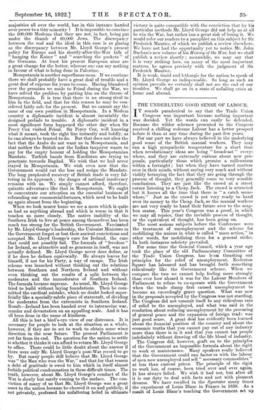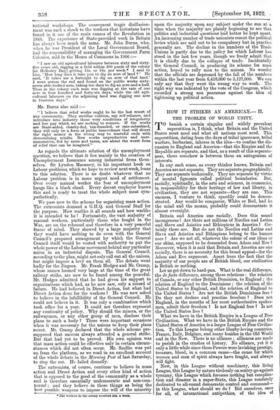THE UNDERLYING GOOD SENSE OF LABOUR.
IT sounds paradoxical to say that the Trade Union Congress was important because nothing important was decided. Yet the words can easily be defended. Because the wilder schemes presented to the Congress received a chilling welcome Labour has a better prospect before it than at any time during the past few years.
For our part we have always believed in the underlying good sense of the British manual workers. They may run a high sympathetic temperature for a short time when revolutionary ideas are being " broadcast " every- where, and they are extremely curious about new pro- posals, particularly those which promise a millennium within a fortnight ; but when they have turned matters over in their minds, without saying very much and without visibly betraying the fact that they are going through the process of thought, they generally come to very sensible conclusions. They are just like the crowd at a street corner listening to a Cheap Jack. The crowd is attracted but it knows all the time that there is " a catch some- where." Just as the crowd is not very ready to hand over its money to the Cheap Jack, so the manual workers are not very ready to hand their future over to the soap- box orator. This year's Congress was a proof, in which we may all rejoice, that the invisible process of thought, or the equivalent of thought, has been going on. The most serious subjects before the Conference were the treatment of unemployment and the scheme for mobilizing the unions in what is called " mass action," in other words, for mobilizing them for a general strike. In both instances sobriety prevailed. For some time the General Council, which a year ago took the place of the old Parliamentary Committee of the Trade Union Congress, has been thrashing out principles for the relief of unemployment. Eccleston Square has laboured and has brought forth something ridiculously like the Government scheme. When we compare the two we cannot help feeling more strongly than ever how absurd it was for the Labour Members of Parliament to refuse to co-operate with the Government when the trade slump first caused unemployment to become an exceedingly grave question. What was new in the proposals accepted by the Congress was not startling. The Congress did not commit itself to any ridiculous rate of relief to the unemployed, and what was said in the resolution about reducing unemployment by the procuring of general peace and the expansion of foreign trade was just good sense. A great deal has evidently been learned about the financial position of the country and about the economic truths that you cannot pay out of any industry more than there is in it and that you cannot tax people indefinitely without drawing off the life blood of industry. The Congress did, however, graft on to the principles of the Government an impossible formula about the right to work or maintenance. Many speakers really believed that the Government could run factor'es with the labour of men now unemployed and sell " necessary commodities " at less than current prices. The principle of the right to work has, of course, been tried over and over again. It has always failed. We wish it had not, but after all it is our duty to deal with facts and not with pleasant dreams. We have recalled in the Spectator many times the experiment of Louis Blanc in France in 1839. As a result of Louis Blanc's teaching the Government set up national workshops. The consequent tragic disillusion- ment was such a shock to the workers that historians have found in it one of the main causes of the Revolution in 1848. The experience of State-provided work in Britain has always been much the same. Mr. John Burns, who, when he was President of the Local Government Board, had the responsibility of managing the Government Farm Colonies, said in the House of Commons in 1906 :- " I saw an old agricultural labourer between sixty and sixty- five years old, digging in a field within 200 yards of the colony [at Hollesley Bay] getting 15s. or 16s. per week.* I said to him, How long does it take you to dig an acre of land ? ' He said, ' It takes me a fortnight to dig an acre of that land.' I went across the rail and found on the public works sixty- seven able-bodied men, taking ten days to dig an acre and a-half. Thus in the colony each man was digging at the rate of one acre in four hundred and forty-six days, while the old agri- cultural labourer on the adjoining land was digging one acre in fourteen days."
Mr. Burns also said :- " I believe that relief works ought to be the last resort of any community. They sterilize volition, sap self-reliance, and introduce into industry those very conditions of irregularity and low pay which we are seeking to remove. If the works are State-aided, charity-fed, tax-founded, or rate-subsidized, they will only be a form of public benevolence that will divert the right money in the wrong way to wasteful ends with demoralizing results. New works unproductive and unre- munerative, fed by rates and taxes, are about the worst form of relief that can be imagined."
As regards the ultimate solution of the unemployment question, we believe that it lies mainly in the creation of Unemployment Insurance among industrial firms them- selves. Sir Lynden Macassey, in his important book on Labour problems, which we hope to review next week, leans to this solution. There is no doubt whatever that no Labour problem is in more urgent need of settlement. Over every manual worker the fear of unemployment hangs like a black cloud. Every decent employer knows this and is ready to treat the whole subject most sym- pathetically.
We pass now to the scheme for organizing mass action. The extremists demand a G.H.Q. and General Staff for the purpose. How warlike it all sounds and how warlike it is intended to be Fortunately, the vast majority of manual workers, particularly those who fought in the War, are on the rebound and therefore in a very peaceful frame of mind. They showed by a large majority that they would have nothing to do even with the General Council's proposed arrangement by which the General Council itself would be vested with authority to put the whole power of the Labour movement behind any particular union in an industrial dispute. The General Council, according to the plan, might not only call out all the unions, but might impose a levy on them all. The debate went badly for the Jingoes. Mr. Frank Hodges and Mr. Cramp, whose names loomed very large at the time of the great railway strike, are now to be found among the peaceful. Mr. Hodges admitted that he had given his support to organizations which had, as he now saw, only a record of failure. He had believed in Direct Action, but what had Direct Action done for the workers ? He was now asked to believe in the infallibility of the General Council. He could not believe in it. It was only a combination which took office for a year. It could not therefore represent any continuity of policy. Why should the miners, or the railwaymen, or any other group of men, disclose their plans to such a body ? There were important occasions when it was necessary for the unions to keep their plans secret. Mr. Cramp declared that the whole scheme pre- supposed that success always attended a general strike. But that had yet to be proved. His own opinion was that mass action could be effective only in certain circum- stances which did not often occur. Mr. Smillie was put on from the platform, as we read in an excellent account of the whole debate in the Morning Post of last Saturday, to stop the rot. He failed dismally.
The extremists, of course, continue to believe in mass action and Direct Action and every other kind of action that is opposed to the good of the community as a whole and is therefore essentially undemocratic and non-com- munal; and they believe in these things as being the best possible weapons to impose the will of the minority • The workers in the colony received 24s. a week. upon the majority upon any subject under the sun at a time when the majority are plainly beginning to see that politics and industrial questions had better be kept apart. An increasing number of trade unionists resent the political levies which are said not to be compulsory but in practice generally are. The decline in the numbers of the Trade Unions is partly due to the policy for which Labour has stood in the last few years, though we freely admit that it is chiefly due to the collapse of trade. Incidentally the General Council, in producing its scheme for mass action, hoped to rally men to the unions. No wonder that the officials are depressed by the fall of the numbers within the last year from 6,418,000 to 5,127,000. We can only say that they went the wrong way to work. The right way was indicated by the vote of the Congress, which recorded a strong non possumu.s against the idea of tightening up political action.



































 Previous page
Previous page